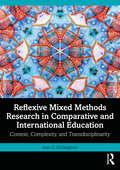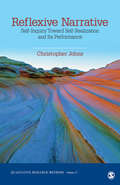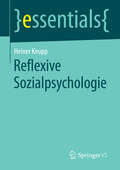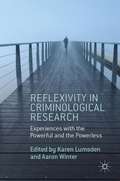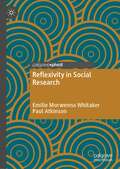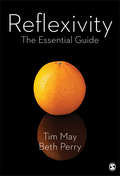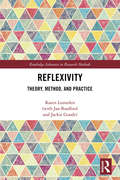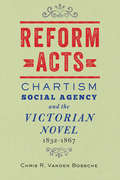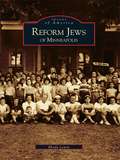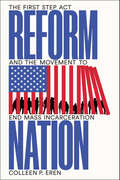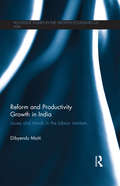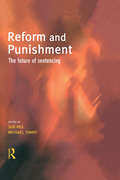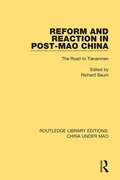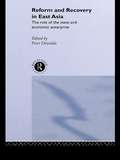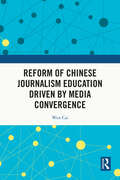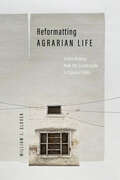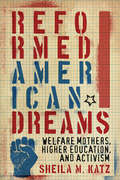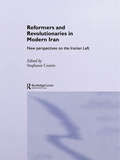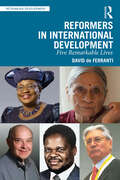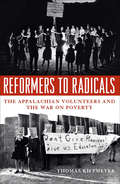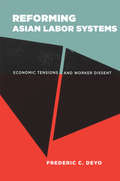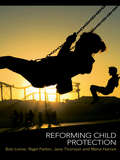- Table View
- List View
Reflexive Mixed Methods Research in Comparative and International Education: Context, Complexity, and Transdisciplinarity
by Joan G. DeJaeghereResponding to both the increase of mixed methods research (MMR) and the lack of dialogue about its philosophical and methodological practices in comparative and international education (CIE) Reflexive Mixed Methods Research in Comparative and International Education: Context, Complexity, and Transdisciplinarity offers readers an overview of different philosophical approaches to mixed methods, as well as the practical processes to engage in MMR with reflexivity.Comparing reflexivity to a kaleidoscope, the author describes how it can be used throughout the research process to engage with different paradigms and methods, as well as to integrate findings and consider emerging interconnections. The book discusses various ways to reflexively adapt designs, methods, and analyses, and integrate findings in MMR to better contextualize knowledge in the field of CIE. It illustrates different approaches to MMR through various case summaries, and each chapter poses reflexive questions for researchers to consider during their research projects. It emphasizes a critical realist approach, particularly for how it involves epistemological pluralism while also offering contingent explanations to educational questions. Through a reflexive approach, the book offers possibilities for conducting better and more epistemically just MMR.This is fascinating reading for both new and more experienced researchers to expand the craft of researching with MM. Interdisciplinary and transdisciplinary teams, as well as sole researchers, will find concrete research practices in the book for employing reflexive MMR to understand complex educational issues.
Reflexive Narrative: Self-Inquiry Toward Self-Realization and Its Performance (Qualitative Research Methods #57)
by Christopher JohnsReflexive Narrative: Self-Inquiry Toward Self-Realization and Its Performance is latest addition to the Qualitative Research Methods series. Author Christopher Johns describes this unique method and its developmental approach to research to enable researchers&’ self-realization however that might be expressed. This method focuses on systematizing the reflective process and providing structure while still remaining flexible to the needs of individual researchers and projects. Researchers collect data through reflections on everyday experiences and then selectively use the evidence of researcher&’s insights. The text starts out with a brief introduction to narrative research and reflexivity, situating the method within the larger context of organizational practices. The next chapters introduce the steps for reflexive narrative research and walk readers through the movements of the reflexive narrative process, writing, reflection, dialogue, guidance, weaving, and audiencing. Additional coverage of ethics and research examples provide a foundation for application of the method to individual research. A chapter on structuring the method for a doctoral thesis furthers the applied nature of this method. Three extracts from studies provide research examples across several social science disciplines, including nursing and education. For students and researchers alike looking for new approaches to reflexive methods and looking to expand their ideas about self-research in a qualitative context, Reflexive Narrative provides a starting place for their own examination of self in the context of research.
Reflexive Narrative: Self-Inquiry Toward Self-Realization and Its Performance (Qualitative Research Methods #57)
by Christopher JohnsReflexive Narrative: Self-Inquiry Toward Self-Realization and Its Performance is latest addition to the Qualitative Research Methods series. Author Christopher Johns describes this unique method and its developmental approach to research to enable researchers&’ self-realization however that might be expressed. This method focuses on systematizing the reflective process and providing structure while still remaining flexible to the needs of individual researchers and projects. Researchers collect data through reflections on everyday experiences and then selectively use the evidence of researcher&’s insights. The text starts out with a brief introduction to narrative research and reflexivity, situating the method within the larger context of organizational practices. The next chapters introduce the steps for reflexive narrative research and walk readers through the movements of the reflexive narrative process, writing, reflection, dialogue, guidance, weaving, and audiencing. Additional coverage of ethics and research examples provide a foundation for application of the method to individual research. A chapter on structuring the method for a doctoral thesis furthers the applied nature of this method. Three extracts from studies provide research examples across several social science disciplines, including nursing and education. For students and researchers alike looking for new approaches to reflexive methods and looking to expand their ideas about self-research in a qualitative context, Reflexive Narrative provides a starting place for their own examination of self in the context of research.
Reflexive Sozialpsychologie: Ambivalenzen Und Potenziale Eines Neuen Altersbildes In Der Flexiblen Arbeitswelt (essentials #8)
by Heiner KeuppDie neue Arbeitswelt ist von zunehmender Unsicherheit geprägt. Diskontinuierliche Beschäftigungsverhältnisse sind weiter auf dem Vormarsch. Für die Beschäftigten in der Wissensökonomie sind damit höhere Freiheitsgrade verbunden, aber auch neue Belastungen - bis hin zum Burnout. Zudem sind Jobnomaden, Freelancer und Zeitarbeitende oft von betrieblicher Gesundheitsförderung ausgeschlossen. Wie und von wem können diese Gruppen bei der Gesundheitsprävention unterstützt werden? Der Band beleuchtet diese Fragen aus verschiedenen sozialwissenschaftlichen Perspektiven und unterfüttert die Argumentation mit empirischen Erkenntnissen.
Reflexivity in Criminological Research
by Karen Lumsden Aaron WinterDoing research with criminals or deviants has inspired much academic reflection, particularly in respect of the risks and dangers which researchers may face in these contexts, as well as the ethical, legal and moral dilemmas they provoke. This collection contributes to, advances and consolidates discussions of the range of methods and approaches in criminology through the presentation of diverse international case studies in which the authors reflect upon their experiences with both powerless and/or powerful individuals/groups. Reflexivity, and the need to be reflexive, permeates all criminological research and the chapters in this collection cover various aspects of this, including gaining access to the field, building relationships with the researched, the impact of the researcher's identity on the research (including gender, class and race), ethics, risk, bias and partisanship, policy implications, and how to disseminate findings and 'give voice' to the researched. A range of research settings are drawn from including those typically involving the powerful, such as state institutions, courts and prisons, to those typically conceived of as powerless, such as deviant and dangerous individuals as well as subcultures including boy racers and hooligans. Research participants defined as vulnerable, for example victims of crime, are also considered. This comprehensive collection explores a variety of methods including interviews, participant observation, virtual ethnography and feminist research. Acknowledging the fluid nature of power relations and dynamics, this volume will be a valuable resource to scholars of criminology and sociology.
Reflexivity in Social Research
by Paul Atkinson Emilie Morwenna WhitakerThis book provides students and researchers with clear guidance through this tricky, but fundamental aspect of qualitative, ethnographic research. The chapters provide a concise overview that clarifies, illustrates and develops a highly popular methodological principle. To some extent, the book is critical of some contemporary approaches, particularly those that portray reflexivity as an optional, virtuous extra. Drawing on a broad range of anthropological, sociological and other sources, it illuminates through example as well as by precept.
Reflexivity: The Essential Guide
by Beth Perry Professor Tim MayReflexivity – the critical examination of how we see the world – is integral to good research practice. From this state-of-the-art, accessible tour of its history and contemporary relevance, readers will learn of its importance to social research and to society generally. The text introduces a host of influential thinkers and their key ideas on reflexivity, and incorporates examples from a range of disciplines and research settings. Drawing on the authors’ extensive experience of real research settings, this book: Pinpoints the importance of reflexivity in social research Demonstrates its relevance to everyday life Firmly locates the concept in the history of ideas Explores key questions about the bases of knowledge and understanding Presents key thinkers, concepts and issues in easy-to-understand learning boxes The result is a book that provides students and researchers in the social sciences with the knowledge and understanding necessary not only to examine the role of reflexivity in contemporary life, but to apply it in their own research practice.
Reflexivity: The Essential Guide
by Beth Perry Tim MayReflexivity – the critical examination of how we see the world – is integral to good research practice. From this state-of-the-art, accessible tour of its history and contemporary relevance, readers will learn of its importance to social research and to society generally. The text introduces a host of influential thinkers and their key ideas on reflexivity, and incorporates examples from a range of disciplines and research settings. Drawing on the authors’ extensive experience of real research settings, this book: Pinpoints the importance of reflexivity in social research Demonstrates its relevance to everyday life Firmly locates the concept in the history of ideas Explores key questions about the bases of knowledge and understanding Presents key thinkers, concepts and issues in easy-to-understand learning boxes The result is a book that provides students and researchers in the social sciences with the knowledge and understanding necessary not only to examine the role of reflexivity in contemporary life, but to apply it in their own research practice.
Reflexivity: Theory, Method, and Practice (Routledge Advances in Research Methods)
by Karen LumsdenReflexivity is valuable in social research because it draws attention to the researcher as part of the world being studied and reminds us that the individuals involved in our research are subjects, not objects. By being reflexive we acknowledge that we cannot be separated from our biographies. This volume reviews key debates concerning reflexivity in theory, methods, and practice. It mounts a defence of reflexivity against new materialist and post-qualitative critiques and the pressures exerted on scholars from the neoliberal marketized university system which privileges fast academia at the expense of slow, reflective scholarship. While defending reflexivity, this book also those identifies issues which plague mainstream sociological operationalizations of a positivistic form of reflexivity. It argues for the extension of reflexivity into domains otherwise neglected in public accounts, and a shift from reflexivity as an individualized quality of the researcher (used to judge peers and navel-gaze) to a feminist, collaborative, reflexive sensibility which is mindful of the wider contexts shaping the construction of knowledge(s), experience(s), and of the role of research communities. Providing examples of reflexivity in action from academics at different stages of their careers, Reflexivity will appeal to students and researchers interested in fields such as Sociology, Qualitative Research Methods, Criminology, Ethnography, and Ethics of Research.
Reform Acts: Chartism, Social Agency, and the Victorian Novel, 1832–1867
by Chris R. Vanden BosscheHow Victorian novels imagined the idea of social agency.Reform Acts offers a new approach to prominent questions raised in recent studies of the novel. By examining social agency from a historical rather than theoretical perspective, Chris R. Vanden Bossche investigates how particular assumptions involving agency came into being. Through readings of both canonical and noncanonical Victorian literature, he demonstrates that the Victorian tension between reform and revolution framed conceptions of agency in ways that persist in our own time.Vanden Bossche argues that Victorian novels sought to imagine new forms of social agency evolving from Chartism, the dominant working-class movement of the time. Novelists envisioned alternative forms of social agency by employing contemporary discourses from Chartism's focus on suffrage as well as the means through which it sought to obtain it, such as moral versus physical force, land reform, and the cooperative movement.Each of the three parts of Reform Acts begins with a chapter that analyzes contemporary conversations and debates about social agency in the press and in political debate. Succeeding chapters examine how novels envision ways of effecting social change, for example, class alliance in Barnaby Rudge; landed estates as well as finely graded hierarchy and politicians in Coningsby and Sybil; and reforming trade unionism in Mary Barton and North and South. By including novels written from a range of political perspectives, Vanden Bossche discovers patterns in Victorian thinking that are easily recognized in today’s assumptions about social hierarchy.
Reform Jews of Minneapolis (Images of America)
by Rhoda LewinThe German Jews who began coming to Minneapolis in the 1850s quickly entered society as doctors, lawyers, professors, merchants, and leaders in clothing and cigar manufacturing. In 1878 they founded Shaarai Tov, now Temple Israel--one of the ten largest Reform congregations in the U.S. today. They also enjoyed a busy social and cultural life, and both husbands and wives involved themselves in social service and welfare organizations. Including historic and present-day photographs and tales of the community--schools, synagogues, organizations, and outdoor activities--this collection uncovers the challenges and triumphs of Reform Jews in Minneapolis.
Reform Nation: The First Step Act and the Movement to End Mass Incarceration
by Colleen P. ErenHow one law tells the story of America's modern criminal justice movement In late 2018, the First Step Act was signed into law by President Donald Trump just hours before a government shutdown. It was one of few major pieces of federal criminal justice reform since the 1970s to move toward reversing the incarceration frenzy that had characterized United States policy. While it did not amount to revolutionary reform, in Reform Nation, Colleen P. Eren investigates it as a symbol for the larger movement's trajectory. Its unlikely passage during a period of political polarization was testament to the power of a new constellation of advocates, stakeholders, and strange bedfellow alliances. These intriguing and complex dynamics are indicative of a longer, twenty-year shift in which the movement became nationalized and mainstreamed. Using in-depth interviews with major players in the national movement, formerly incarcerated activists, celebrities, and donors, this is the first book to turn the mirror back on the criminal justice reform movement itself—the frames used, the voices heard, the capital activated among elite participants, and the bitter controversies. This snapshot in time raises much larger questions about how our democratic processes inform criminal justice policy, and where we are going in the decades to come.
Reform and Productivity Growth in India: Issues and Trends in the Labour Markets (Routledge Studies in the Growth Economies of Asia)
by Dibyendu MaitiDuring the last two decades, India has experienced a high growth rate, but the contribution from productivity growth and technological progress has been very low. This has resulted in a poor performance in the employment generation in the formal sector, and this book examines this phenomenon and the Indian growth pattern. Using primary and secondary data, the book looks at the impact of economic reform on technological change and total productivity growth, and in turn its impact on the labour market. It examines the effect of trade reform on the form and functioning of labour markets, and goes on to look at the impact of the global financial crisis on the Indian labour market. Offering interesting modelling exercises and empirical verifications that bring fresh ideas and new content, this book is of interest to academics in the fields of development economics, international economics and South Asian studies.
Reform and Punishment (Cambridge Criminal Justice Series)
by Michael Tonry Sue RexIn this book a group of leading authorities in the field address the key issues surrounding the future of sentencing in Britain, in the light particularly of the highly influential Halliday Report. These proposals for reform amount to the single most ambitious and comprehensive set of proposals for reconstituting the sentencing system of a common-law country, and include proposals to replace existing sentencing statutes, the establishment of a sentencing commission and sentencing guidelines, and the creation of a sentence review function in the judiciary. As well as addressing the major issues of the Halliday Report the chapters in this book go beyond this to explore the broader set of policy problems and implications which are raised, drawing upon experiences of reform in other jurisdictions and contexts, particularly that of the USA. This book will be essential reading for anybody with an interest in the future of sentencing or the future direction of the criminal justice system as a whole.
Reform and Reaction in Post-Mao China: The Road to Tiananmen (Routledge Library Editions: China Under Mao #12)
by Richard BaumThe decade of the 1980s began in China with great expectations of the societal benefits of modernisation, and ended with gunfire in Tiananmen Square. This book, first published in 1991, presents essays that explore the political and economic reform policies that emerged in post-Mao China under Deng Xiaoping. In general, they conclude that the advent of partial marketization and structural reform tended to magnify structural contradictions rather than solve them.
Reform and Recovery in East Asia
by Peter DrysdaleThis exciting sequel to East Asia in Crisis offers a completely up-to-date assessment of the progress of East Asian recovery, including coverage of the controversial topic of the role of the state in East Asian development. Featuring an outstanding line-up of international contributors, many of whom also contributed to East Asia in Crisis, this title also provides a detailed review of the experience of the region's economies. It is stimulating and informative reading for all those interested in further understanding the dynamics of East Asian economic crisis and recovery.
Reform of Chinese Journalism Education Driven by Media Convergence
by Wen CaiThis book explores the significant changes in Chinese journalism education in response to the rapid development of digital and new media technologies.It emphasizes the need for journalism education reform to keep pace with changing times and cultivate talents with an international outlook, innovative capabilities, and professional skills. It begins by exploring the concept of media convergence and its historical development, as well as the challenges and opportunities it presents for journalism and communication education. In particular, it explains how media convergence affects the demand for journalistic talent and changes the concept of journalism education in China. The author then presents practical examples of journalism education reform in China, including innovations in talent development models, curriculum reforms, and textbook improvements. A case study of reform practices in a top journalism school in China adds depth to the discussion of educational reform and core curriculum development. The author also discusses unresolved issues in journalism education reform, such as the scale of education, the positioning of talent cultivation, and the construction of faculty teams, and proposes solutions.The book will appeal to scholars and students of journalism education, journalism and new media, Chinese journalism, and Chinese studies.
Reformatting Agrarian Life: Urban History from the Countryside in Colonial India (South Asia in Motion)
by William J. GloverReformatting Agrarian Life presents a stealth urban history from the countryside that foregrounds the mutual entanglements of agrarian and urban expertise. William J. Glover traces an essential genealogy for understanding how urbanism unexpectedly left the city in late colonial India and began to settle in agrarian space, exploring how two milieus that were initially seen as distinct were gradually brought together both conceptually and in practices of ordinary life. He argues that rural change and the expert knowledge associated with managing the countryside in colonial India opened paths for urban concepts and forms to permeate agrarian settings where they were previously thought to have little relevance. This process indelibly shaped idioms and modes of agrarian life, just as it gave rural problems and processes a structural role in urban discourse. By illuminating the intellectual paths by which agrarian and urban processes came to be understood as co-constituting, and exploring multiple vivid, empirically rich case studies of projects where those relations were made evident, this book presents a compelling case to move beyond traditional intellectual silos and enter new theoretical territory to understand processes of urban and rural transformation.
Reformed American Dreams: Welfare Mothers, Higher Education, and Activism
by Sheila M. KatzReformed American Dreams explores the experiences of low-income single mothers who pursued higher education while on welfare after the 1996 welfare reforms. This research occurred in an area where grassroots activism by and for mothers on welfare in higher education was directly able to affect the implementation of public policy. Half of the participants in Sheila M. Katz’s research were activists with the grassroots welfare rights organization, LIFETIME, trying to change welfare policy and to advocate for better access to higher education. Reformed American Dreams takes up their struggle to raise families, attend school, and become student activists, all while trying to escape poverty. Katz highlights mothers’ experiences as they pursued higher education on welfare and became grassroots activists during the Great Recession.
Reformers and Revolutionaries in Modern Iran: New Perspectives on the Iranian Left (Routledge/BIPS Persian Studies Series)
by Stephanie CroninEven though the left has never held power in Iran, its impact on the political, intellectual and cultural development of modern Iran has been profound. This book's authors undertake a fundamental re-examination and re-appraisal of the phenomenon of leftist activism in Iran, interpreted in the broadest sense, throughout the period of its existence up to and including the present.
Reformers in International Development: Five Remarkable Lives (Rethinking Development)
by David de FerrantiThis book brings to life the remarkable stories of five exceptional international development leaders and influencers: Ngozi Okonjo-Iweala, Domingo Cavallo, Ela Bhatt, Dzingai Mutumbuka, and Adolfo Figueroa. Together, their experiences and accomplishments challenge us to rethink conventional notions of leadership and international development and to reflect on how others from Africa, Asia, and Latin America will change the world in the years ahead. Drawing on the author’s decades-long relationships with each of the five, the book tells how they overcame incredible barriers and dreadful odds to rise from ordinary and challenged backgrounds to achieve extraordinary impact in important roles, both in their countries and globally. With original firsthand insights, the book explores the character-revealing decisions they made, confronting moral dilemmas between protecting their country, their career, their values, and even their lives when threatened by corrupt antagonists. The book combines a free-flowing storytelling style with an analytical framework to examine how these five determined individuals struggled to reduce poverty, protect basic rights, and promote justice. The book will be invaluable for the international development community, practitioners, students, and researchers. It will also captivate general readers new to the fascinating subject of how African, Asian, and Latin American countries develop and what that will mean for the world as a whole. While many books have been written on what should be done to help rising nations thrive, this one takes readers inside the human story of who brings about change and how.
Reformers to Radicals: The Appalachian Volunteers and the War on Poverty
by Thomas KiffmeyerA “well researched and vigorously written” account of social activism, radical politics, and the failed War on Poverty in 1960s Appalachia (Journal of American History).In 1964, a group of young social activists formed the Appalachian Volunteers with the intention of eradicating poverty in eastern Kentucky and the rest of the Southern mountains. In Reformers to Radicals, author Thomas Kiffmeyer documents the history of this organization as their youthful enthusiasm led to radicalism and controversy.These reformers sought to improve the lives of the Appalachian poor while making strides toward economic change in the region. Their efforts included refurbishing schools and homes and offering educational opportunities. But in time, these volunteers faced nationwide accusations that they were “seditious” and “un-American.” After losing the support of the federal and state governments and of many Appalachian people, the group to disband in 1970.Reformers to Radicals examines the various factors that led to the Appalachian Volunteers’ ultimate failure, from infighting within their ranks to tensions with the very people they sought to help. It chronicles a critical era in Appalachian history and investigates the impact the 1960s' reform attitude on the region.
Reforming Asian Labor Systems: Economic Tensions and Worker Dissent
by Frederic C. DeyoIn Reforming Asian Labor Systems, Frederic C. Deyo examines the implications of post-1980s market-oriented economic reform for labor systems in China, South Korea, the Philippines, and Thailand. Adopting a critical institutionalist perspective, he explores the impact of elite economic interests and strategies, labor politics, institutional path dependencies, and changing economic circumstances on regimes of labor and social regulation in these four countries. Of particular importance are reform-driven socioeconomic and political tensions that, especially following the regional financial crisis of the late 1990s, have encouraged increased efforts to integrate social and developmental agendas with those of market reform. Through his analysis of the social economy of East and Southeast Asia, Deyo suggests that several Asian countries may now be positioned to repeat what they achieved in earlier decades: a prominent role in defining new international models of development and market reform that adapt to the pressures and constraints of the evolving world economy.
Reforming Boston Schools, 1930 to the Present
by Joseph Marr CroninBoston's schools in 2006 won the Eli Broad Prize for the Most Improved Urban School System in America. But from the 1930s into the 1970s the city schools succumbed to scandals including the sale of jobs and racial segregation. This book describes the black voices before and after court decisions and the struggles of Boston teachers before and after collective bargaining. The contributions of universities, corporations and political leaders to restore academic achievement are evaluated by one who observed Boston schools for forty years.
Reforming Child Protection
by Nigel Parton Bob Lonne Maria Harries Jane ThomsonChild protection is one of the most high profile and challenging areas of social work, as well as one where children’s lives and family life are seen to be at stake. Vital as child protection work is, this book argues that there is a pressing need for change in the understanding and consequent organization of child protection in many English speaking countries. The authors present compelling evidence from around the globe demonstrating that systems across the Western world are failing children, families and social workers. They then set out a radical plan for reform: Providing an overview of contemporary child protection policies and practices across the English speaking world Presenting a clear and innovative theoretical framework for understanding the problems in the child protection system Developing an alternative, ethical framework which locates child protection in the broader context of effective and comprehensive support for children, young people and families at the neighbourhood and community levels Grounded in the recent and contemporary literature, research and scholarly inquiry, this book capitalises on the experiences and voices of children, young people, families and workers who are the most significant stakeholders in child protection. It will be an essential read for those who work, research, teach or study in the area.
